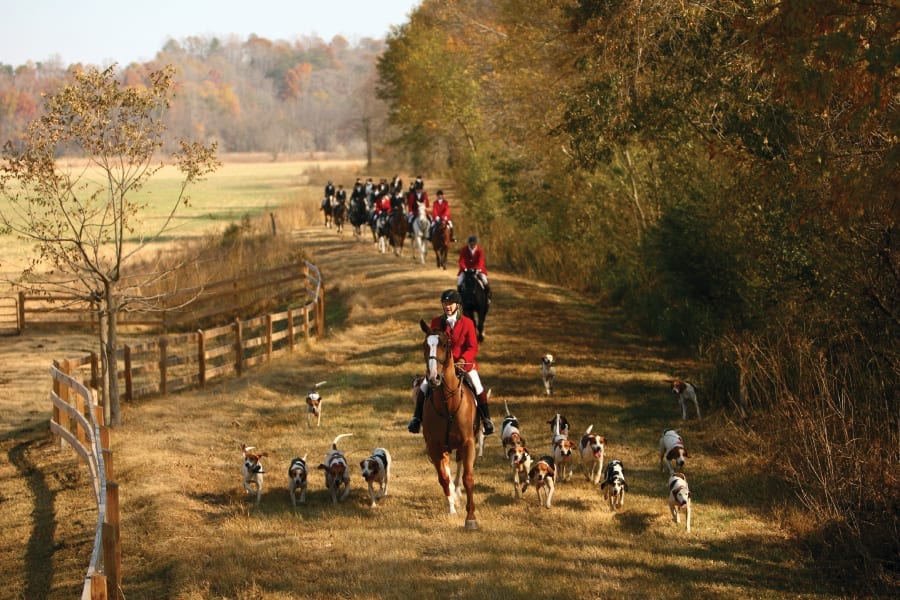Tallyho! A woman takes over the reigns of Tryon Hounds
By Rebecca Carr
Photographs by Josh Norris
Wearing scarlet jackets lined with gold buttons, white breeches, and well-polished black boots, the hunt masters call the meet to order. A hush spreads through the assembled riders as they lower their heads in prayer. An Episcopal priest raises his hands over an unyielding pack of hounds; wind whips his robes.
“Grant that the skilled and cunning fox may be our pilot to a deeper understanding and love of your natural world. … And bless our brothers the hounds, who guide us upon the chase….”
The huntsman blows a brass horn into the air, signaling the start of the chase. Horses, manes braided in tight knots, paw the ground as the hounds lunge forward. Riders tuck flasks inside gold vests and follow, snaking in a line, behind the huntsman. On this Thanksgiving morning, the pack will cross fields with waving amber weeds, clear 3-foot fences, slosh through rocky creeks and creep down steep muddy ditches, all in search of quarry.
For as long as anyone can remember, the Tryon Hounds Hunt has gathered this way each Thanksgiving on the same hillside in the shadows of the Blue Ridge Mountains. The opening of this hunt, one of the oldest and most prestigious in the South, is a tradition that has been carried on from generation to generation. But this year marks a significant shift from that tradition. For the first time in the hunt’s 90-year-old history, a woman will command the Tryon Hounds.
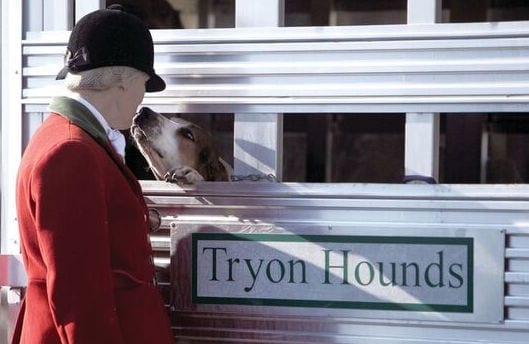
Beth Blackwell is known for her innate ability to communicate with the hounds. “Beth has an extraordinary human-animal connection,” says Becky Barnes, president of the Tryon Hounds.
As huntsman, Beth Blackwell is something of a rarity in the foxhunting world. While women have long held volunteer leadership posts, such as master to great acclaim, the role of huntsman, the person paid to care and train a hunt’s coveted hounds, has solidly remained in the reins of men. The vast majority, 72 percent, of the 162 huntsmen in North America are men. But just 11 out of the 46 female huntsmen are paid professionals, according to Lt. Col. Dennis J. Foster (USA, ret.), executive director of the Virginia-based Masters of Foxhounds Association of America, the governing body of organized fox hunting.
Men have dominated fox hunts ever since Robert Brooke arrived in Maryland with his family and private pack of hounds in 1650. But the commonly held image of a statuesque man in a red coat leading a privileged set of riders on a chase has been slowly changing over the past five decades. For one, foxhunting is starting to attract riders from all socioeconomic classes, Foster said. Women now routinely outnumber men in the field and represent about half of all the masters, volunteer leaders charged with spurring new membership, overseeing finances and running the management of the hunt, according to Foster. He expects that as women continue to rise in rank, more hunts will tap women to be their huntsman.
“Overall, women can be more sensitive than men and able to identify details that a lot of men overlook,” Foster said. With a pack of hounds, you are reading each hound as an individual, so it is important to have a high level of sensitivity to their needs, he said.
Blackwell takes over at a critical time for Tryon Hounds. Like most hunts in North America, the hunt faces declining membership and development eating away at hunt country. Other hunts have given away to casual dress and western riders to attract new members, but Tryon Hounds has resisted that change, holding fast to the British tradition of formal attire. The field wears black leather boots and breeches to protect riders from branches on a run, heavy black melton coats and a stock tie, fastened with a gold safety pin. The pin serves as a bandage for rider, hound or horse in case of an accident.
Tryon Hounds is addressing those challenges by ramping up its marketing on social media, expanding social activities to attract non-riding members as well as opening up more than 4,000 acres of new hunting territory, said Becky Barnes, president of Tryon Hounds. To improve safety for the hounds, the hunt recently purchased GPS collars to better track them during hunts.
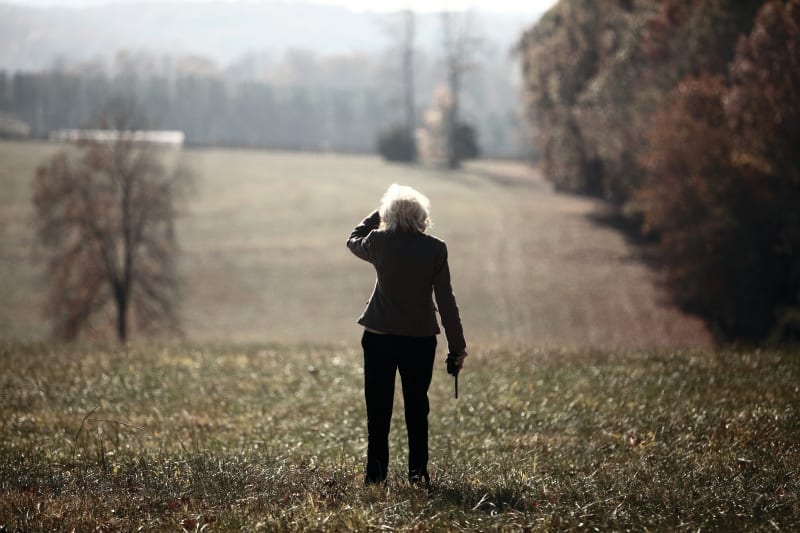
A road crew follows the hunt to ensure the safety of horse, hound and rider. To improve safety for the hounds, the hunt recently purchased GPS collars to better track them.
But many in the hunt consider the addition of Blackwell to be the most valuable of Tryon’s modernization upgrades. Her background in foxhunting and foot hunting basset hounds leaves her well suited for the role of huntsman. And in the hunts staged so far this season, her transition to the new job has been seamless.
“Beth has an extraordinary human-animal connection,” Barnes said. “She is a tremendous asset for the hunt.”
Blackwell stood out among other job candidates because she immediately asked to see the hunt’s hounds. That spoke volumes about where her priorities were. “I was impressed by that,” said Bonnie Lingerfelt, one of the hunt’s masters. “It takes a unique person to be a huntsman, whether female or male. You have to have a natural sense for the game, wildlife and how a hound picks up scent.”
Life as a huntsmen
Blackwell took her first riding lesson at the age of 9 and was hooked. When her parents, both academics, moved her family to Austin, Texas, she continued riding, competing and, ultimately, teaching. Years later, after studying equine management at Colorado State University, Blackwell became a horse trainer of her own barn in Northwest Florida.
On a lark, she went foxhunting with a friend in Alabama and fell in love with the sport. “I was playing with the hounds after the hunt and had this gut feeling that this is what I should have been doing all of my life,” she said. She promptly returned to Florida, closed down her barn and moved to Alabama to start working with the Hard Away-Whitworth hunt. At 53, she has hunted in 11 states and served in leadership roles for five packs and hunted the hounds as a professional with the Tennessee Valley Foxhounds and De La Brooke Foxhounds in Maryland.
Blackwell is known as both a horsewoman and as a “houndswoman.” One of her goals is to continue her love of hunting on foot with bassets. She brought her pack with her to Tryon Hounds and has launched a foot hunt program to entice new members to get out into nature to hunt.
The magical part of foxhunting for her is watching the hounds work.
“I go into the cover. I send the hounds forward to hunt. They disappear into the cover and work the line. I hear them start to speak on the line and they move away from me on a run. At the end of the day, it is amazing to blow the horn and have them all magically reappear out of the woods. It makes me feel like we are all connected with nature.”
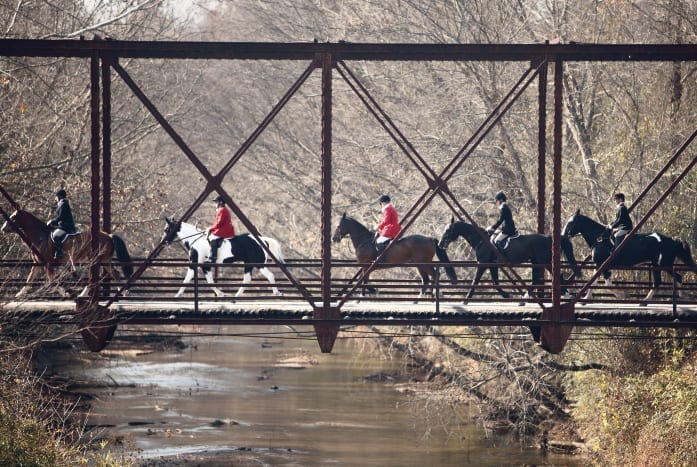
On Thanksgiving morning, the pack crossed fields with waving amber weeds, sloshed through rocky creeks and crossed over a bridge – all search of quarry.
Blackwell is part of a small tribe of women who have fallen for a life, sometimes nomadic, dedicated to caring for hounds and horses. It is a life that can be both solitary when handling the animals and socially demanding as you are also the charismatic leader of the hunt.
“It is absolutely a rare thing to have a woman in the role of huntsman,” said Kami Wolk, huntsman and master of the Wentworth Hunt in New Hampshire. “There is just a handful of us.”
Slender, with delicate features, Blackwell belies the stereotype of a huntsman who can lift 50 pounds of grain or clear heavy brush from miles of woods. But she is every bit as tough.
“There is a stigma in that many believe women are too soft for the job and a lot of the masters, male masters at least, feel like it is a man’s job,” Blackwell said. “On hunting day, the huntsman is the boss, and that can be hard for a lot of men to handle, as is the case in the corporate world. Like everything, they say they don’t have a problem, but at the end of the day they do at the core, and that is a pretty big challenge.”
Another day, another adventure
On this cold and rainy day, Blackwell stands in a low-slung, dank dog kennel pouring dog food into long, thin metal troughs, for seven hound pens. Hounds, with names like Ragweed, Bourbon, Scarlett, Willow, Martini and Blossom, bark in deafening tones as they await their turn to feed. All told, there are 50 hounds and 16 basset hounds in the pens split between the pups, younger and older hounds.
Blackwell’s morning started at 4:30 a.m. when she heard rain on the roof for the first time in months. She smiled to herself, knowing that it would soften the hard ground for the coming hunt. But that peaceful moment quickly ended. Blackwell looked out to the pasture and nearly dropped her coffee. One of her four horses had busted out the back of his stall to escape. She had to rummage through moving boxes, fresh from her move to Tryon, to find her rain gear. She captured her horse in the pouring rain, rain falling so hard that you could barely see.
“I feel so blessed that I can do the thing that I love as a job. I don’t make a lot of money, but if I won the lotto, I would probably do the same thing every day,” said Blackwell.
When Blackwell first sought a job as huntsman some 15 years ago, she consulted with Dr. Roger I. Scullin, a longtime master of the Howard County-Iron Bridge Hounds in Maryland. Scullin went through a list of hunts who were looking for a huntsman, noting the ones that would never hire a woman. There were a lot of them, even then. But Scullin also said something that empowered her. He told her that in his view, women could make better huntsmen than men because of their sensitive ways with animals.
Those words encouraged her and powered her forward.
“Beth is a natural,” said Scullin, 73, a veterinarian and fox hunting enthusiast since the age of 16. “When you watch her, you can see that she does not treat this as a job. Fox hunting is a passion for her, and that is what makes her so good.”
For the past 15 years, Blackwell has ridden a chestnut-colored horse named Elvis. He is her partner. The pair are so tightly intertwined that Elvis will sometimes know what she wants to do in the hunt before she does. It is uncanny.
“His name suits him,” she said. “He is the King.”
While some traditions in fox hunting are essential, new traditions need to be adopted to sustain and expand existing hunts and to launch new ones. And Beth Blackwell might just be the vanguard for that type of change.
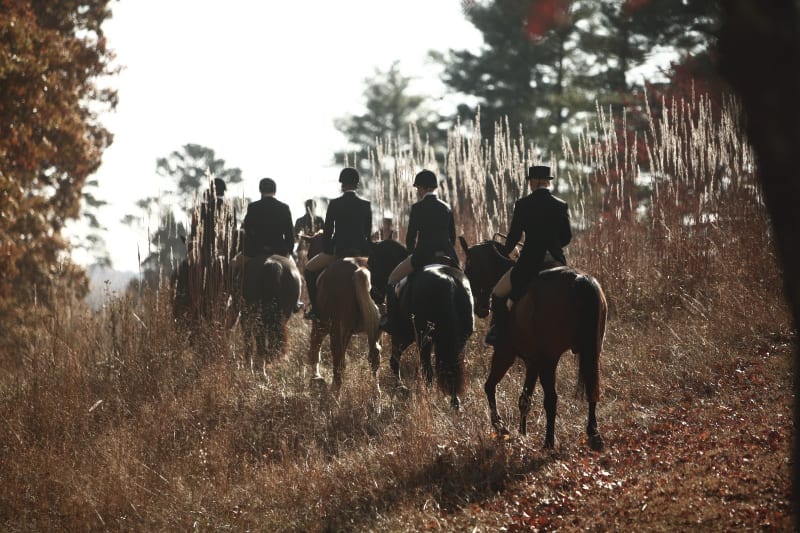
Author’s note: Rebecca Carr learned how to fox hunt from her mother, a long-standing member of Tryon Hounds. Rebecca recently joined as a member.
This article was first published on August 17, 2018

